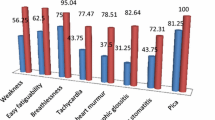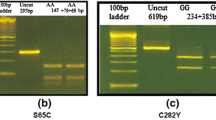Abstract
Several studies reported that there were the associations between the genetic polymorphisms in the mitochondrial DNA (mtDNA) and some blood iron markers. Thus, we tried to investigate the relationship between two genetic polymorphisms (5178C/A and 16189T/C) in the mtDNA and several blood iron markers in Korean men. A total of unrelated 131 Korean men were participated in this study. Two genetic polymorphisms in the mtDNA was determined by polymerase chain reaction (PCR) and restriction fragment length polymorphism (RFLP) method, and hematological or biochemical assay performed by autoanalyzer. Although the 16189T/C polymorphism was not significantly associated with any iron parameters measured in this study, we found that the 5178C/A polymorphism was significantly associated with red blood cell (RBC) count and hematocrit (HCT) value in Korean men (P < 0.05). Therefore, our data suggest that the 5178C/A polymorphism in the mtDNA might be useful as a genetic marker with respect to blood iron metabolism.




Similar content being viewed by others
References
Anderson S, Bankier AT, Barrell BG et al (1981) Sequence and organization of the human mitochondrial genome. Nature 290:457–565
Wallace DC (1994) Mitochondrial DNA sequence variation in human evolution and disease. Proc Natl Acad Sci USA 91:8739–8746
Graff C, Clayton DA, Larsson NG (1999) Mitochondrial medicine: recent advances. J Intern Med 246:11–23
Murakami H, Soma R, Hayashi J et al (2001) Relationship between mitochondrial DNA polymorphism and the individual differences in aerobic performance. Jpn J Physiol 51:563–568
Scott RA, Wilson RH, Goodwin WH et al (2005) Mitochondrial DNA lineages of elite Ethiopian athletes. Comp Biochem Physiol Part B 140:497–503
Walter PB, Knutson MD, Paler-Martinez A et al (2002) Iron deficiency and iron excess damage mitochondria and mitochondrial DNA in rats. Proc Natl Acad Sci USA 99:2264–2269
Tanaka M, Gong J-S, Zhang J et al (1998) Mitochondrial genotype associated with longevity. Lancet 351:185–186
Kokaze A, Ishikawa M, Matsunaga N et al (2001) Association of the mitochondrial DNA 5178 A/C polymorphism with serum lipid levels in the Japanese population. Hum Genet 109:521–525
Kokaze A, Ishikawa M, Matsunaga N et al (2004) Longevity-associated mitochondrial DNA 5178 A/C polymorphism and blood pressure in the Japanese population. J Hum Hypertens 18:41–45
Mukae S, Aoki S, Itoh S et al (2003) Mitochondrial 5178 A/C genotype is associated with acute myocardial infarction. Circ J 67:16–20
Takagi K, Yamada Y, Gong J-S et al (2004) Association of 5178C → A(Leu237Met) polymorphism in the mitochondrial DNA with a low prevalence of myocardial infarction in Japanese individuals. Atherosclerosis 175:281–286
Ohkubo R, Nakagawa M, Ikeda K-I et al (2002) Cerebrovascular disorders and genetic polymorphisms: mitochondrial DNA 5178C is predominant in cerebrovascular disorders. J Neurol Sci 198:31–35
Wang D, Taniyama M, Suzuki Y et al (2001) Association of the mitochondrial DNA 5178A/C polymorphism with maternal inheritance and onset of type 2 diabetes in Japanese patients. Exp Clin Endocrinol Diabetes 109:361–364
Matsunaga H, Ogawa O, Tanaka Y et al (2001) Antiatherogenic mitochondrial genotype in patients with type 2 diabetes. Diabetes Care 24:500–503
Kokaze A, Ishikawa M, Matsunaga N et al (2005) Interaction between longevity-associated mitochondrial DNA 5178 C/A polymorphism and cigarette smoking on hematological parameters in Japanese men. Arch Gerontol Geriatr 40:113–122
Poulton J, Brown MS, Cooper A et al (1998) A common mitochondrial DNA variant is associated with insulin resistance in adult life. Diabetologia 41:54–58
Casteels K, Ong K, Phillips D et al (1999) Mitochondrial 16189 variant, thinness at birth, and type-2 diabetes. Lancet 353:1499–1500
Das S, Bennett AJ, Sovio U et al (2007) Detailed analysis of variation at and around mitochondrial position 16189 in a large Finnish cohort reveals no significant associations with early growth or metabolic phenotypes at age 31 years. J Clin Endocrinol Metab 92:3219–3223
Kim JH, Park KS, Cho YM et al (2002) The prevalence of the mitochondrial DNA 16189 variant in non-diabetic Korean adults and its association with higher fasting glucose and body mass index. Diabet Med 19:681–684
Liou CW, Lin TK, Weng HH et al (2007) A common mitochondrial DNA variant and increased body mass index as associated factor for development of type 2 diabetes: additive effects of genetic and environmental factors. J Clin Endocrinol Metab 92:235–239
Park KS, Chan JC, Chuang LM et al (2008) A mitochondrial DNA variant at position 16189 is associated with type 2 diabetes mellitus in Asians. Diabetologia 51:602–608
Poulton J, Luan J, Macaulay V et al (2002) Type 2 diabetes is associated with a common mitochondrial variant: evidence from a population-based case-control study. Hum Mol Genet 11:1581–1583
Tang DL, Zhou X, Li X (2005) Variation of mitochondrial gene and the association with type 2 diabetes mellitus in a Chinese population. Diabetes Res Clin Pract 68:S10–S21
Weng S-W, Liou C-W, Lin T-K et al (2005) Association of mitochondrial deoxyribonucleic acid 16189 variant (T → C transition) with metabolic syndrome in Chinese adults. J Clin Endocrinol Metab 90:5037–5040
Beutler E, Beutler L, Lee PL et al (2004) The mitochondrial nt 16189 polymorphism and hereditary hemochromatosis. Blood Cells Mol Dis 33:344–345
Livesey KJ, Wimhurst VLC, Carter K et al (2004) The 16189 variant of mitochondrial DNA occurs more frequently in C282Y homozygotes with haemochromatosis than those without iron loading. J Med Genet 41:6–10
Salvador M, Villegas A, Llorente L et al (2007) 16189 Mitochondrial variant and iron overload. Ann Hematol 86:463–464
Österreicher CH, Datz C, Sticket F et al (2005) Association of myeloperoxidase promoter polymorphism with cirrhosis in patients with hereditary hemochromatosis. J Hepatol 42:914–919
Marchington DR, Poulton J, Sellar A et al (1996) Do sequence variants in the major non-coding region of the mitochondrial genome influence mitochondrial mutations associated with disease? Hum Mol Genet 5:473–479
Agani FH, Pichiule P, Chavez JC et al (2000) The role of mitochondria in the regulation of hypoxia-inducible factor 1 expression during hypoxia. J Biol Chem 46:35863–35867
Walter PB, Knutson MD, Paler-Martinez A et al (2002) Iron deficiency and iron excess damage mitochondria and mitochondrial DNA in rats. Proc Natl Acad Sci USA 99:2264–2269
Yao Y-G, Kong Q-P, Zhang Y-P (2002) Mitochondrial DNA 5178A polymorphism and longevity. Hum Genet 111:462–463
Cann RL, Stoneking M, Wilson AC (1987) Mitochondrial DNA and human evolution. Nature 325:31–36
Iwao N, Iwao S, Kobayashi F et al (2003) No association of the mitochondrial genotype (Mt5178A/C) with six cancers in a Japanese population. Asian Pac J Cancer Prev 4:331–336
Kim JH, Park KS, Cho YM et al (2002) The prevalence of the mitochondrial DNA 16189 variant in non-diabetic Korean adults and its association with higher fasting glucose and body mass index. Diabet Med 19:681–684
Horai S, Hayasaka K (1990) Intraspecific nucleotide sequence differences in the major noncoding region of human mitochondrial DNA. Am J Hum Genet 46:828–842
Liou CW, Lin TK, Weng HH et al (2007) A common mitochondrial DNA variant and increased body mass index as associated factor for development of type 2 diabetes: additive effects of genetic and environmental factors. J Clin Endocrinol Metab 92:235–239
Weng S-W, Liou C-W, Lin T-K et al (2005) Association of mitochondrial deoxyribonucleic acid 16189 variant (T → C transition) with metabolic syndrome in Chinese adults. J Clin Endocrinol Metab 90:5037–5040
Mountain JL, Herbert JM, Bhattacharyya S et al (1995) Demographic history of India and mtDNA-sequence diversity. Am J Hum Genet 56:979–992
Author information
Authors and Affiliations
Corresponding author
Rights and permissions
About this article
Cite this article
Kang, B.Y., Choi, H., Kwon, J. et al. The 5178C/A and 16189T/C polymorphisms of mitochondrial DNA in Korean men and their associations with blood iron metabolism. Mol Biol Rep 37, 4051–4057 (2010). https://doi.org/10.1007/s11033-010-0064-8
Received:
Accepted:
Published:
Issue Date:
DOI: https://doi.org/10.1007/s11033-010-0064-8




